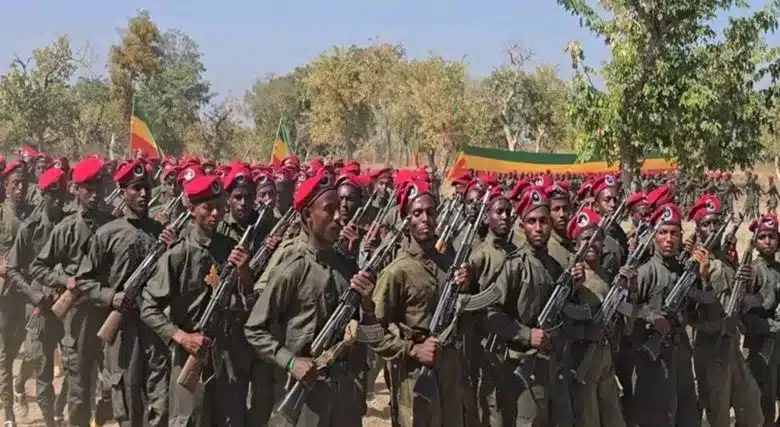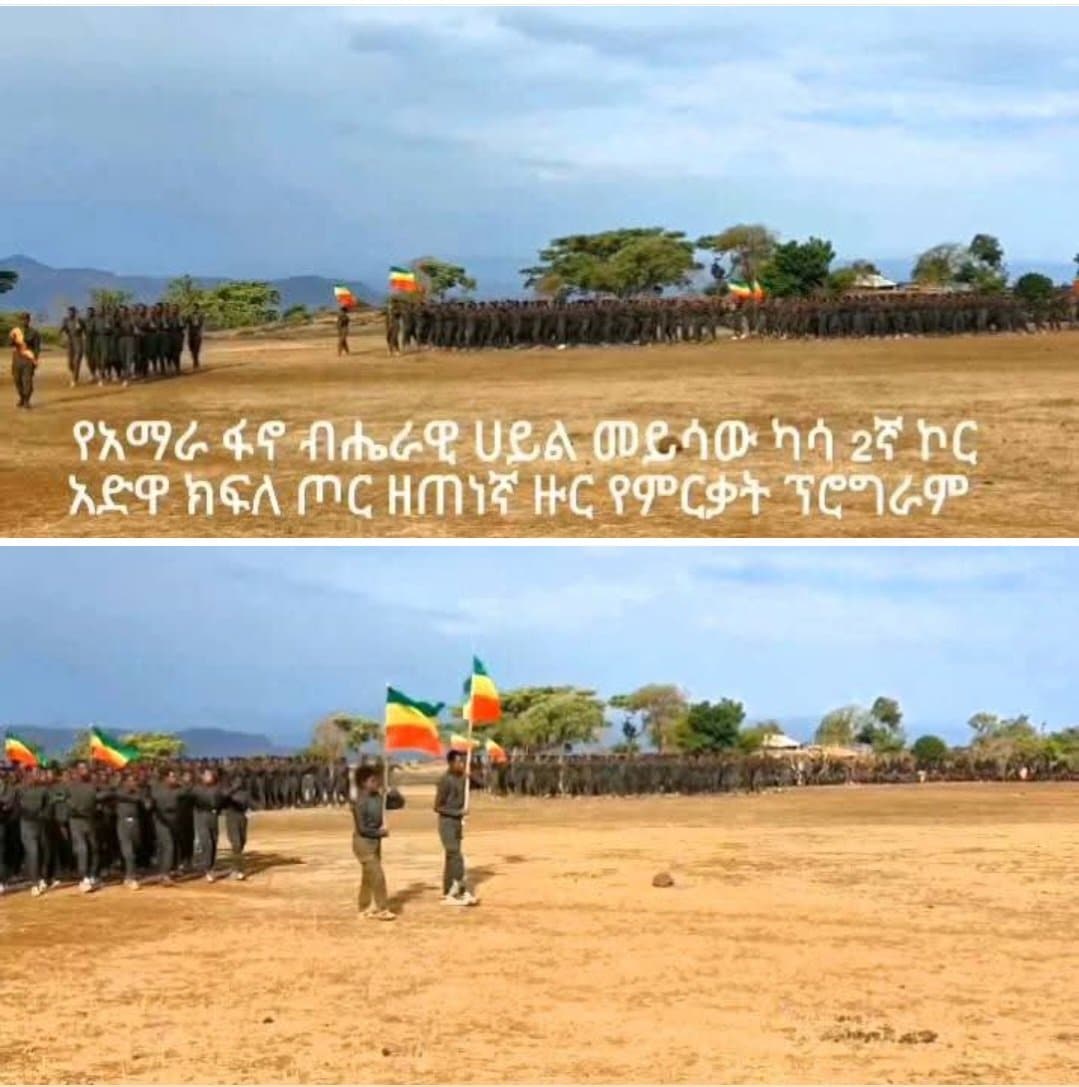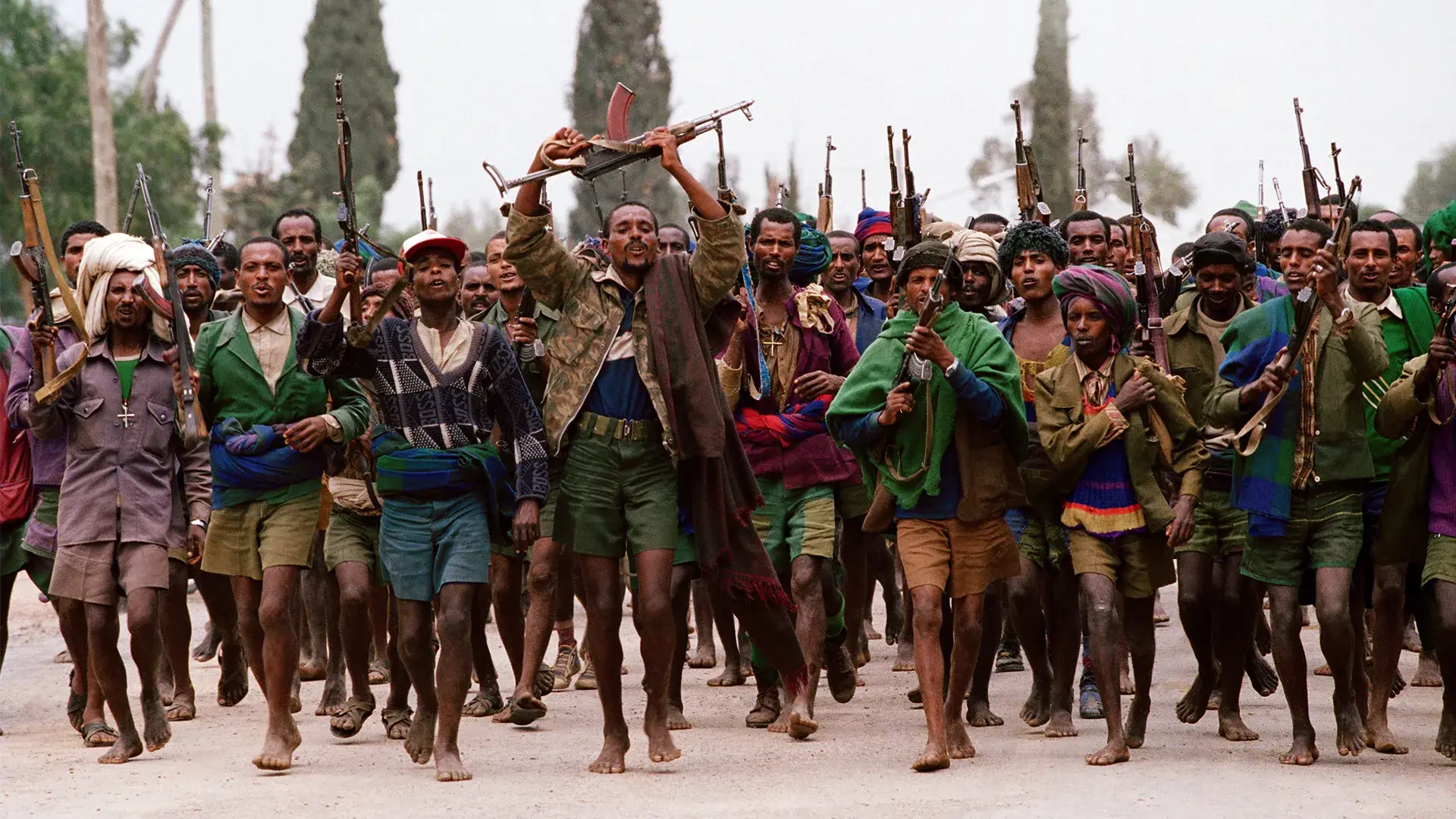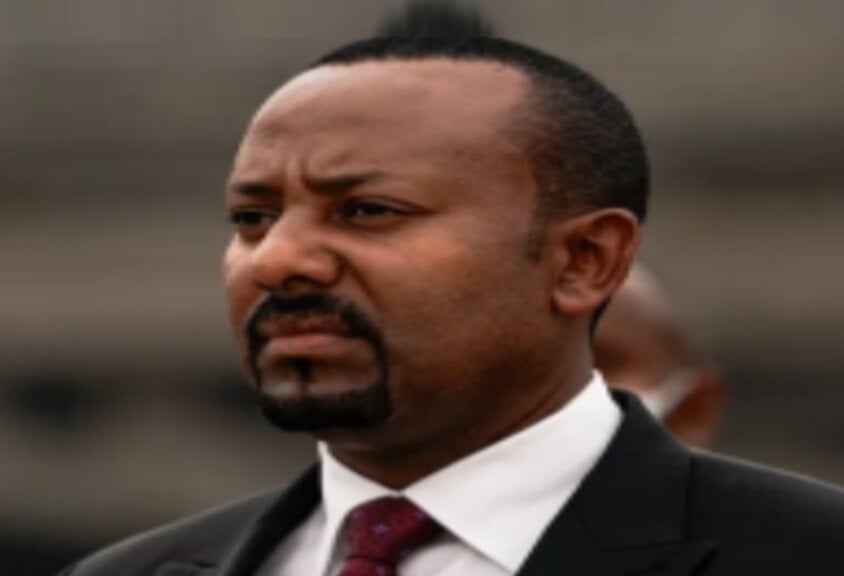
Today marks a significant milestone for the Amhara Fano National Force (AFNF) as recruits graduate after an intensive 6-month training program. This development comes amid a delicate political landscape in Ethiopia, where the Amhara Fano self-defense forces have gained prominence. The AFNF asserts its role in protecting the interests of the Amhara ethnic group, especially in light of what they perceive as targeted aggression against them. With newfound skills, these recruits are now equipped to contribute effectively to their communities’ security.
The AFNF’s principled stance underscores a blend of defensive readiness and political advocacy, echoing their commitment to safeguarding human rights and fostering peace and stability. As they step forward, these graduates represent a new wave of defenders prepared to navigate the challenging terrain of Ethiopia’s ongoing conflicts.
Graduating recruits today, especially those joining the Amhara Fano National Force, symbolize hope and resilience for future stability.
Overview of the Amhara Fano National Force
The Amhara Fano National Force (AFNF) stands as a formidable entity representing the Amhara people in Ethiopia. Its emergence and subsequent actions are deeply rooted in the historical experiences and adversities faced by the Amhara community. Here, we delve into the historical context and current stance of the AFNF amid ongoing challenges.
Historical Context of AFNF
The historical backdrop of the AFNF is pivotal in understanding its foundation and subsequent development. This context is characterized by a series of events and motivations that led to its formation and the role it plays today.
Reasons for Formation
The formation of the Amhara Fano National Force is primarily a response to manifold challenges and persistent grievances experienced by the Amhara ethnic group. Historical injustices, systematic marginalization, and targeted violence have contributed significantly to the collective consciousness of the Amhara people. These adversities necessitated the establishment of a force capable of defending the rights and lives of the Amhara community. Over decades, the Amhara people have called for fair treatment and equitable national policies, but these pleas often fell on deaf ears, leading to the eventual decision to form a self-defense force.
Peaceful Advocacy Efforts
Before taking up arms, the AFNF, along with supportive Amhara communities, engaged in peaceful advocacy efforts. For years, they sought to address grievances through dialogue, demonstrations, and negotiations in a bid to secure their rights and protect their lands from encroachment and violence. Notably, these efforts included peaceful protests and collaboration with various human rights organizations to highlight the injustices faced by the Amhara people. Despite the persistence of these advocacy measures, the lack of tangible government response or action necessitated a shift towards more direct forms of self-defense and protection, leading to the militarization within the AFNF.

AFNF’s Stance in Current Conflict
Amid the ongoing conflict in Ethiopia, the AFNF has taken a definitive stance, focusing on addressing both immediate threats and long-term sustenance.
Opposition to the Prosperity Party
The Prosperity Party, led by Prime Minister Abiy Ahmed, is viewed by the AFNF as an adversarial force in relation to the rights and safety of the Amhara people. The AFNF positions itself in staunch opposition, alleging that policies and actions under the Prosperity Party’s administration have contributed significantly to the marginalization and endangerment of the Amhara community. This opposition is underpinned by instances of alleged human rights violations and an inadequacy in addressing violence aimed at Amhara civilians, which AFNF argues constitutes a coordinated campaign detrimental to their existence.
Call for Sustainable Solutions
In response to the crisis, the AFNF advocates for sustainable solutions as a means to resolve the conflict and restore stability. The group emphasizes the necessity of solutions that uphold the protection of civilian lives and ensure equitable access to resources and rights for all Ethiopians. They urge both national actors and international stakeholders to work towards a model of governance that prioritizes peace, security, and the protection of all ethnic groups within the Ethiopian demographic tapestry. Through their calls, the AFNF seeks to engage with diplomatic efforts aimed at fostering long-term peace and coexistence, beyond immediate political gains.
This overview lays the foundation for understanding the Amhara Fano National Force’s journey, unveiling the motivations and advocacy efforts that have defined its path. In the subsequent parts, further exploration into the AFNF’s training, engagement, and regional role continues.
Training and Graduation of Recruits
The Amhara Fano National Force (AFNF) is committed to preparing its recruits through a comprehensive training and graduation process. The structured curriculum reflects the organization’s broader goals and the critical need to equip recruits with the necessary skills to effectively engage in their duties and responsibilities.
Six-Month Training Curriculum
The Six-Month Training Curriculum is meticulously designed to ensure that recruits receive a holistic education, encompassing military, strategic, and humanitarian competencies. This curriculum is central to the AFNF’s mission and vision for preparing a capable and ready force.
Training Objectives and Goals
The Training Objectives and Goals are clear and focused:
- Skill Development: Ensuring recruits acquire essential military skills, including tactical maneuvers, weapon proficiency, and strategic planning.
- Ethical Training: Highlighting the importance of ethical conduct, recruits learn to respect the rights of civilians and maintain integrity in all operations.
- Leadership and Teamwork: Encouraging the development of leadership qualities and teamwork, preparing recruits to lead and collaborate effectively in various scenarios.
- Community Support: Integrating humanitarian principles, recruits are trained to support and protect their communities, stressing the significance of civilian protection and welfare.
This is a note about the significance of maintaining a balanced focus between military and humanitarian skills in training.
Areas of Focus
The Areas of Focus in the training curriculum include:
- Combat Techniques: Training in diverse combat situations, enabling recruits to handle various environments and challenges.
- Security Operations: Instruction on maintaining secure operations, including checkpoint management and intelligence gathering.
- Disaster Response: Educating recruits on responding to natural and manmade disasters, enhancing their ability to assist in humanitarian crises.
- Cultural Awareness: Understanding local customs and practices, ensuring that operations are conducted with cultural sensitivity and awareness.
Graduation Ceremony Details
The Graduation Ceremony Details celebrate the completion of the intensive training program. It marks a significant milestone for recruits as they transition from training to active duty.
- Ceremony Highlights: The event includes remarks from prominent community leaders and AFNF officials, underscoring the recruits’ dedication and the importance of their future roles.
- Award Ceremonies: Distinguished recruits receive accolades for outstanding performance, recognizing excellence and inspiring future cohorts.
- Pledge of Service: Graduates commit to upholding the values and responsibilities imparted during their training, affirming their readiness to serve and protect their communities.
Graduating recruits are seen as the embodiment of the AFNF’s principles, carrying forward a legacy of resilience, community service, and unwavering commitment to the well-being of the Amhara Region.
AFNF’s Engagement with US Diplomacy
Response to US Embassy Statement
Ambassador Ervin Massinga’s Role
The Amhara Fano National Force (AFNF) has expressed appreciation for the pivotal diplomatic engagement by U.S. Ambassador Ervin Massinga, highlighting his role as a significant figure in mediating dialogue and signaling the United States’ commitment to addressing the multifaceted crisis in Ethiopia. Ambassador Massinga’s role has been crucial in fostering a channel for communication between conflicting parties, illustrating the U.S. Embassy’s active involvement in Ethiopia’s peace-building process. This engagement is seen as essential by the AFNF, as it underscores the importance of international diplomacy in achieving regional stability.
Echoing Humanitarian Concerns
The AFNF has strongly echoed the humanitarian concerns raised by the U.S. Embassy‘s statement, aligning itself with international calls to prioritize civilian protection and address the dire humanitarian crisis in the country. The U.S. Embassy’s acknowledgment of the pressing need for humanitarian intervention resonates deeply with the AFNF, which has repeatedly highlighted the suffering of Amhara civilians amidst the ongoing conflict. By echoing these concerns, the AFNF hopes to amplify global awareness and catalyze the delivery of essential aid, advocating for increased humanitarian assistance to affected regions.
Importance of US Diplomatic Efforts
Resolution of the Conflict
The importance of U.S. diplomatic efforts cannot be overstated in the quest for a peaceful resolution to the conflict in Ethiopia. The AFNF believes that the strategic involvement of the United States serves as a catalyst for dialogue and negotiation, aiming to bring lasting peace to a war-torn region. The U.S. engagement offers a diplomatic platform where diverse perspectives can be heard, contributing to a framework that encourages reconciliation and a methodical resolution of disputes. The AFNF acknowledges that U.S. diplomatic influence is crucial in navigating the complex political landscape, fostering an environment where enduring solutions can be crafted.
Support for Civilian Welfare
Support for civilian welfare is a key aspect where U.S. diplomatic efforts have been influential, providing a humanitarian lifeline to those severely affected by the conflict. The AFNF appreciates U.S. initiatives designed to bolster civilian welfare, such as facilitating access to education, healthcare, and other essential services. These efforts underline a commitment to preserving the human dignity of those in crisis, reinforcing the view that long-term stability necessitates robust support for civilian infrastructure. By championing civilian welfare, the U.S. underscores a humanitarian approach that aligns with the AFNF’s goals for rebuilding a peaceful and prosperous Amhara region.
The Challenges in the Amhara Region
Current Humanitarian Crisis
The Amhara Region of Ethiopia is currently grappling with a severe humanitarian crisis. This crisis has been exacerbated by continued violence, displacements, and the destruction of infrastructure and services that sustain everyday life for its citizens. The toll on the people has been overwhelming, impacting various aspects of life, including education and healthcare.
Impact on Education and Healthcare
Education and healthcare systems are significantly affected by the ongoing crisis. Schools and health facilities have been damaged or destroyed, depriving children of their right to education and limiting access to essential medical care for the population. Consequently, thousands of children are left without schooling, and the community is faced with challenges in obtaining critical health services. This situation not only impairs the development of the region but also jeopardizes the future of young generations who are missing out on vital learning opportunities and the foundation for good health.
Access to Essential Services
Access to essential services such as water, sanitation, and electricity has become increasingly limited. The disruption in these services compounds the difficulties faced by the people, making everyday life a struggle. The lack of clean water and adequate sanitation facilities poses health risks, while the absence of reliable electricity affects both households and businesses, leading to further socio-economic challenges. The population’s resilience is continually tested as they navigate these harsh realities in their daily lives.
AFNF’s Role in the Region
The Amhara Fano National Force (AFNF) plays a crucial role in the region amid the challenges it faces. As the crisis unfolds, AFNF has taken on responsibilities aimed at defending and protecting the civilians of the Amhara Region.
Defense and Protection of Civilians
The AFNF has stepped up as a pivotal defender, focusing on the protection of civilians against any form of aggression. The organization acts as a self-defense force, positioning itself as a shield for the most vulnerable during these turbulent times. Its efforts are geared towards ensuring that communities are safe from violence and oppression, restoring a sense of security among those who have suffered.
Future Plans and Objectives
As part of its commitment to the Amhara Region, the AFNF is strategizing for the future with clear plans and objectives. The force aims to establish peace and stability through continued advocacy and collaboration with national and international stakeholders. They are focused on rebuilding the region’s infrastructure, improving access to essential services, and reinforcing a system where human rights and dignity are paramount. The vision for the future includes laying a foundation for sustainable development that empowers the Amhara people, ensuring they thrive beyond the crisis.
The Habesha




